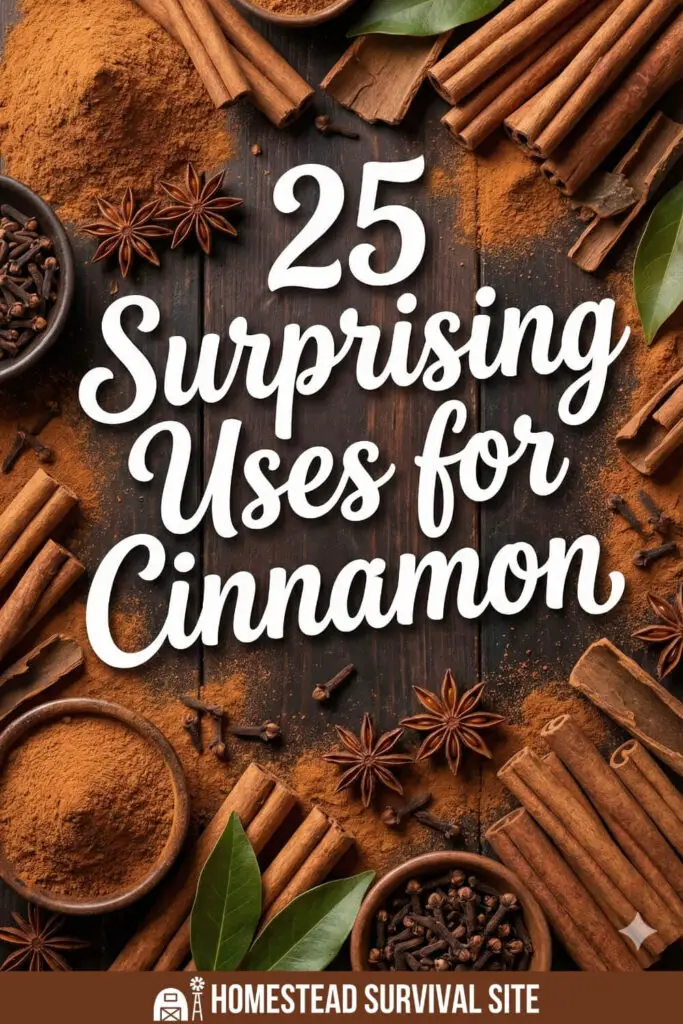Estimated reading time: 11 minutes
We sprinkle it in on hot beverages, cereal, and toast. We bake it into cakes, rolls, and chocolate recipes, and it adds savory goodness to lamb and chicken dishes. Its sweet aroma evokes memories of childhood and Christmas celebrations.
You probably have a jar of ground cinnamon and/or cinnamon sticks on your pantry shelf. But it may be time to add to your supply. Cinnamon is a valuable spice that offers many health and lifestyle benefits. Historical records trace its use as a preservative, as a medicine, and as an anointing oil to ancient times. In fact, one of the earliest books on Chinese botanical medicine, which dates to around 2,700 B.C., mentions cinnamon.
First, let's look at some basic Cinnamon 101. The two basic types of the ancient spice are Cassia (sometimes called “Chinese cinnamon”), which originated in southern China, and Ceylon (also called “true cinnamon”), which is native to southern India and Sri Lanka.
The two varieties are made from the inner bark of different types of Cinnamomum trees. Strips of this inner bark are cut and dried until they begin to curl into rolls that are known as sticks or quills. These sticks then can be used as-is, made into an extract, or ground into a powder. The spice's distinctive smell and flavor comes from the oil in the bark, which is rich in the compound cinnamaldehyde.
Want to save this post for later? Click Here to Pin It on Pinterest!
Cassia cinnamon is darker in color and has a stronger flavor than the Ceylon kind. While both have comparable health benefits, Cassia cinnamon contains coumarin, a compound that can be harmful when consumed in very large doses. A teaspoon a day of either Ceylon or Cassia cinnamon is considered safe. All varieties of cinnamon belong to the diverse Lauraceae plant family, which also includes avocado and bay leaves.
Nearly all the cinnamon found in supermarkets throughout the world is the Cassia variety. You can find the more expensive Ceylon kind in some health food stores and online. When stored in airtight containers in a cool, dark location, cinnamon sticks will remain fresh and flavorful for about one year.
Similarly stored, ground cinnamon will stay potent for three to four years. It's important to realize that cinnamon, like most spices, does not “go bad.” It merely loses flavor over extended storage time. Your nose is your best guide for freshness and flavor.
Now, here are 25 reasons to stockpile cinnamon.
As An Antioxidant
Cinnamon contains some of the same compounds (including polyphenols, phenolic acid, and flavonoids) that are found in dark berries, red wine, and dark chocolate.
These compounds help reduce free radical damage in the body and can slow the effects of aging. Cinnamon is even higher in terms of its antioxidant values than garlic, rosemary, oregano, and thyme.
Balance Insulin
Cinnamon consumption can help lower blood sugar levels in the body while improving sensitivity to insulin, the key hormone needed for blood sugar balance.
Insulin resistance can lead to Type 2 diabetes and metabolic syndrome. Cinnamon can decrease the amount of glucose that enters the bloodstream after a meal and can lower fasting blood sugar levels by as much as 29 percent.
Boost Metabolism
Cinnamaldehyde, the oil that gives cinnamon its flavor and aroma, may help regulate the body's metabolism. A 2017 study published in the journal Metabolism found that exposure to cinnamon oil triggered fat cells from both mice and humans to start burning calories through the process called thermogenesis. Therefore, cinnamon may aid in weight management.
Boost Your Mood
The scent of cinnamon has been shown to reduce irritability and improve mood. Studies suggest that the smell of cinnamon can enhance alertness, reduce fatigue, and even boost performance on certain mental tasks. Diffuse cinnamon oil or keep a small sachet of cinnamon sticks nearby when you’re working, studying, or just need a mental lift.
Clean Teeth
If you read the label on many natural kinds of toothpaste and mouthwashes, you may notice cinnamon as an ingredient. The spice has been used for many centuries as a natural way to treat toothaches, and it helps freshen the breath. Anti-microbial effects of cinnamon may even help prevent tooth decay and mouth infections.
Cover Scuffs and Scratches
If you have any small scuffs or scratches on wood furniture, you can use cinnamon to cover them up. Just rub ground cinnamon onto them and soon they won't be noticeable anymore.
Deter Garden Pests
Cinnamon can help protect your garden from fungus and pests. Sprinkle ground cinnamon on the soil around your plants to deter mushrooms and mold growth. It also acts as a mild natural pesticide — ants, gnats, and other small pests dislike the strong smell. It’s safe for plants and pets, making it a good choice for natural gardening.
Deter Pantry Pests
Cinnamon can help protect stored foods from insects that ruin long-term pantry supplies. Ants, weevils, and pantry moths are repelled by its strong aroma.
Placing cinnamon sticks or small sachets of ground cinnamon in grain bins, flour containers, or food storage shelves can help deter infestations. While it’s not a substitute for airtight storage, it adds an extra layer of protection using a natural, shelf-stable spice.
Fight Cold and Flu
Cinnamon has long been used in traditional remedies for cold and flu symptoms. When combined with honey, it can soothe a sore throat and calm coughing. The antimicrobial properties in cinnamon may help fight the underlying infection, while its warming nature helps improve circulation and ease chills. Try adding a dash to warm tea or a spoonful of honey.
Fight Fungus
Cinnamon consumption can reduce the amount of harmful Candida Albicans in the body's digestive tract. Overgrowth of Candida can lead to gut inflammation, vaginal infections, digestive problems, and autoimmune symptoms.
Cinnamon can also be used to treat fungal conditions such as athlete's foot. To treat it, boil 10 sticks of cinnamon in a quart of water. Let it cool off until it's just warm, then soak your feet in the cinnamon water for 20 to 30 minutes.
Fight Tumors
Cinnamaldehyde, a compound found in cinnamon, is looking promising in animal studies on tumor growth, cell mutation and DNA damage. Studies involving mice with colon cancer have demonstrated that cinnamon consumption help to detoxify enzymes in the colon, slowing tumor growth.
Freshen The Air
The warm, spicy aroma of cinnamon makes it a natural choice for freshening indoor air without synthetic chemicals. You can simmer cinnamon sticks in water with orange peels and cloves for a DIY potpourri that leaves your home smelling cozy and clean.
You could also add a few drops of cinnamon essential oil to a diffuser or spray bottle mixed with water to deodorize any room.
Improve Brain Health
Although research is ongoing in this area, cinnamon consumption may boost cognitive function and offer some protection from neurological disorders such as Parkinson's disease and Alzheimer's disease. In animal studies, cinnamon has prohibited the buildup of tau proteins in the brain.
These proteins are associated with Alzheimer's and Parkinson's disease. Also, just the smell of cinnamon can help increase your ability to perform tasks involving attention, memory and hand-eye coordination.
Improve Heart and Blood Health
Cinnamon consumption has been linked with reduced LDL (“bad”) cholesterol levels, increased HDL (“good”) cholesterol, and lower blood pressure. Cinnamon also helps in blood clotting and in proper blood circulation.
These factors may lower the risk of heart disease and stroke. Recent studies have shown that cinnamon consumption may even help reduce the effects of a high-fat diet.
Improve Skin Health
The anti-microbial and antibiotic properties in cinnamon help protect the skin from rashes and help the healing process from acne, rosacea, and allergic reactions.
Livestock and Coop Pest Control
Cinnamon can be used around small livestock areas to discourage insects. Sprinkling cinnamon powder in cracks of chicken coops, nesting boxes, or feed storage areas may help deter mites, ants, and flies.
While it should not be applied directly to animals in large quantities, its natural insect-repelling properties make it a useful supplemental tool for homesteaders seeking low-chemical pest control options.
Preserve Food
Cinnamon has natural anti-fungal properties that help it serve as a natural preservative. It was in high demand in Medieval Europe for this purpose and was one of the first and most prized commodities traded between the Near East and Europe.
Promote Hair Growth
There is some evidence that cinnamon can stimulate hair growth. Just mix together equal parts cinnamon and honey and apply it to any areas where your hair is thinning.
Reduce Food Spoilage Odors
Cinnamon’s antimicrobial properties and strong scent make it useful for managing odors in root cellars, pantries, and food storage rooms.
Placing bowls of cinnamon sticks or sachets of ground cinnamon in enclosed storage spaces can help neutralize musty smells caused by dampness or aging produce. This was a common practice before modern air fresheners and refrigeration.
Reduce Foot Odor
Because of its antibacterial and antifungal properties, cinnamon can help neutralize foot odor. Boil a few cinnamon sticks in water, let it cool, and soak your feet for 15 to 20 minutes. This simple foot bath can help reduce sweat-related bacteria and leave your feet smelling fresher.
Reduce Inflammation
The antioxidants in cinnamon can help lower inflammation in the human body, including reducing swelling, repairing tissue damage, relieving muscle soreness, and lowering certain allergic reactions.
In traditional Chinese medicine, cinnamon is a mainstay in cold or flu remedies. It often is mixed in a healing tea along with some fresh ginger.
Repel Insects
While we enjoy the smell of cinnamon, some insects can't stand it. Try sprinkling cinnamon wherever you see ants enter your home or wiping down door and window openings with a solution of cinnamon essential oil and water to repel ants and spiders.
Cinnamon sticks are also an important deterrent to moths. Or make a sachet of cinnamon sticks, cloves, and rosemary and hang it in your closet or place it in your dresser drawer for moth protection.
Soothe Nausea
Cinnamon is great for an upset stomach (in small amounts). Boil a cinnamon stick in a cup of water for 10 minutes, strain it, then slowly sip the resulting tea.
Support Circulation
Cinnamon has a warming effect on the body and has traditionally been used to improve circulation. In colder climates or during grid-down heating shortages, cinnamon tea can help promote blood flow and reduce the sensation of cold hands and feet.
This warming quality made cinnamon a valued spice in traditional winter remedies, especially when combined with ginger or honey. For homesteaders working outdoors in cold weather, it can be a simple morale- and comfort-boosting addition.
Treat Infections
The cinnamaldehyde in cinnamon also may help fight the growth of certain dangerous bacteria, including listeria and salmonella. Cinnamon oil has been used to treat respiratory tract infections that were caused by fungi.
More Uses
We won't include it on our list, but historians have discovered that in addition to using cinnamon as a medicine and as a flavoring, the Ancient Egyptians used cinnamon as an embalming agent!
One of the oldest spices known to humans, cinnamon is mentioned in the Bible in at least four different verses.
- “Take also for yourself the finest of spices: of flowing myrrh five hundred shekels, and of fragrant cinnamon half as much, two hundred and fifty, and of fragrant cane two hundred and fifty” — Exodus 30:23
- “Nard and saffron, calamus and cinnamon, With all the trees of frankincense, Myrrh, and aloes, along with all the finest spices. — Song of Solomon 4:14
- “I have sprinkled my bed with myrrh, aloes, and cinnamon.” — Proverbs 7:17
- “And cinnamon and spice and incense and perfume and frankincense and wine and olive oil and fine flour and wheat and cattle and sheep, and cargoes of horses and chariots and slaves and human lives.” — Revelation 18:13
Today, Ceylon cinnamon is produced mostly in Sri Lanka, India, Madagascar, Brazil, and the Caribbean, while Cassia is produced mainly in China, Vietnam, and Indonesia. If the label does not specify the product's country of origin, it is probably the Cassia variety.
Cinnamons that specify on the label that they are made in Vietnam usually command a much higher price than simple ground cinnamon found on your grocery store shelf. Vietnamese cinnamon can sell at more than $4 per ounce, compared with as little as 90 cents per ounce for the kinds with generic labels.
Are the fancier cinnamons worth the extra money? In 2016, Cook's Illustrated magazine tested eight different varieties by adding them to a chilled rice pudding, baking them into cinnamon rolls and sprinkling them on pita chips.
The magazine's research team’s findings were that the pricier Vietnamese cinnamon had a noticeably spicier taste when sprinkled on the cold rice pudding, but that taste differences were not noticeable on the chips or in the rolls.
The reason is that cinnamaldehyde is extremely unstable in the presence of heat. Therefore, if you want to add cinnamon to a cold food or beverage, you might prefer the higher-priced varieties. Otherwise, the less expensive kinds may work well for your long-term needs.
Like this post? Don't Forget to Pin It On Pinterest!
You May Also Like:











